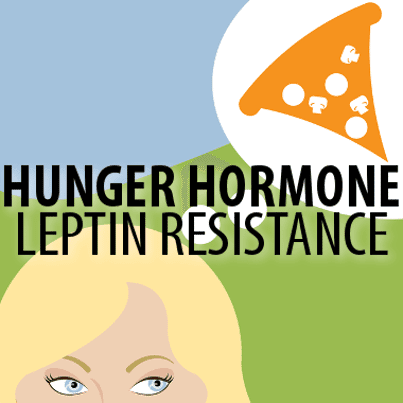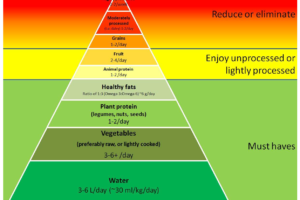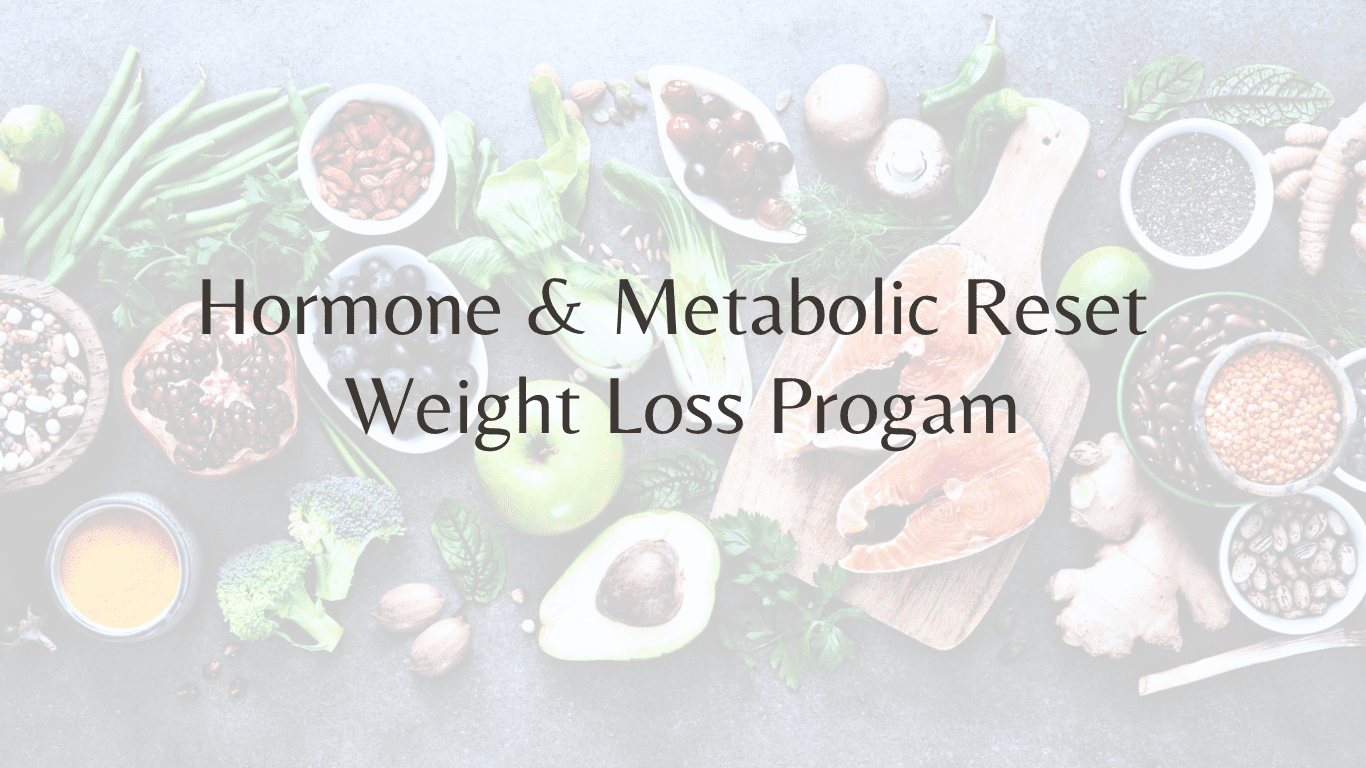 Meet Leptin.
Meet Leptin.
It’s often called the “starvation hormone” or the “satiety hormone.” When it’s working right, you lose your appetite after you eat enough to meet your body’s energy needs.
This is the unfortunate reality for millions of people out there…and sorting it out just might be the key to unlocking their weight loss and health struggles.
What is Leptin & What Does It Do?
Leptin is considered the counterpart to the hunger hormone ghrelin, and is produced by the adipose (fat) tissue. Leptin signals to your brain to let you know that you’re full. When leptin levels are high, your brain knows that it’s full and tells you to stop eating.
This hormone serves two major purposes:
It sends signals to your brain that you’re hungry or full, and
It regulates your body’s energy expenditure
Normally, ghrelin and leptin will work like a system of checks and balances…
But what happens when one of these hormones is out of balance?
The more fat cells you have, the greater the amount of leptin in your body.
Leptin signals your brain to stop eating once you’ve replenished your energy stores. But that only happens when the signaling mechanism is working right.
Almost everyone has the leptin they need to function. But things break down when their brains stop receiving leptin’s signals and responding to them accordingly.
This is a condition called “leptin resistance.” Your brain struggles to recognize (and respond to) the hormone signaling. So you end up feeling hungry all the time—even when you eat more than enough food to fuel your body.
Your body is full, but your brain tells you that you’re starving. This leads to all kinds of nasty health problems. Leptin resistance has been linked to obesity, bone problems, and even an increased risk of heart disease.
How do you know if you’re leptin resistant?
Millions of people are leptin resistant. Most of them don’t even know what leptin is—much less the serious health consequences leptin resistance creates.
The typical modern diet is a huge factor. Eating a lot of sugars, grains, and processed foods causes your fat cells to flood your body with leptin. Do it often enough, and the body adapts by becoming resistant to leptin.
This process—it works similarly to how people become resistant to insulin—leaves you feeling sick, tired, and hungry all the time… even when you’re eating way more than your body needs.
Good news, though. You can take action to restore leptin sensitivity and turn your health around. The first step toward fixing the problem: getting a proper diagnosis.
Are you resistant to leptin?
Here are five guidelines that may help you determine if you are:
1. You’re Overweight (or Underweight)
The easiest way to find out if you’re leptin resistant? Hop on a scale or take a look in the mirror.
If you’re 15 pounds overweight or more—and a good portion of that fat is accumulated on your belly—you’re almost certainly leptin resistant. Extra weight is often a byproduct of your brain not being able to respond to leptin properly. Carrying extra weight is a pretty good indication something’s up in this area.
If you’re struggling to lose weight, leptin resistance could be to blame. Willpower is effective at the beginning of diet plans—when motivation is high. But there’s a reason most diets fail over the long-term: hormone hunger signals eventually trump self-discipline. So if you’ve been trying everything under the sun to shed a few pounds but nothing’s working, don’t beat yourself up. Getting leptin issues sorted out is one of the best things you can do to achieve sustainable weight loss.
You don’t have to be overweight to be struggling with leptin resistance. If you’re more than 10 or 15 pounds underweight, your body’s response to leptin might be out of whack.
Bottom line: if your weight falls outside a healthy range—and you’ve been trying to change it unsuccessfully—you’re probably leptin resistant.
2. You Have Food Cravings Constantly
Driving yourself crazy between meals? Snacking all the time? You could be leptin resistant.
This happens all the time. People make healthy eating a priority, and they start setting aside time to prepare three or four meals to get them through the day. But what happens between those meals? What happens when they find themselves slipping out to the refrigerator when they’re supposed to be in bed? Out of control food cravings (especially cravings for junk food) are common symptoms of leptin resistance.
Try spacing out your meals so there are at least 4 hours between them, and don’t let yourself snack. If this is difficult for you, there’s a good chance you’re leptin resistant.
3. You’re Under Eating
If you’re trying to clean up your diet and lose weight fast, it’s tempting to drastically cut your caloric intake. Maybe you want to speed through the pain of “dieting” as quickly as you can. Or shred that last layer of fat before beach season. Whatever your motivation, this type of extreme calorie restriction can backfire. Cutting way down on calories causes your body to adapt by becoming even more resistant to leptin.
After such a sudden change, your body does everything in its power to hang on to stored fat. Bottom line: drastically reducing calories makes it even harder to lose extra weight.
This happens to a lot of people unintentionally when they switch to a “diet”. Some are great about cutting out sugars and processed foods, but they struggle to replace enough of those calories with better alternatives.
You might be drastically undershooting the calories it takes to maintain your current weight (or lose weight at a sustainable level).
If you’re in the middle of a crash diet, now’s the best time to stop. Putting a solid foundation in place to increase leptin sensitivity—and keep it that way—is a more sustainable path to long-term weight control and health.
Read my recent blog post on “5 Signs You’re a Chronic Under-Eater” here….
4. You’re Stressed Out and Sleep Deprived
Road rage and sleep-deprived office workers are fixtures of modern society. It seems like everyone’s frazzled and stressed out no matter where you look.
Most people underestimate just how dangerous this stuff can be when it comes to controlling their weight and health. It’s easy to get trapped in a vicious cycle. A combination of high stress and not enough sleep spikes your cortisol (stress hormone) levels. And more cortisol leads to more stress and less sleep — which leads to even more cortisol.
That cycle ends the same way every time: poor health.
If you aren’t taking action to manage your stress or get enough (7-8 hours) sleep each night, you’re making your body more resistant to leptin. High cortisol levels lead to leptin resistance. Left unchecked, leptin resistance leads to obesity, inflammation, and an increased risk of heart disease.
5. You Follow a Typical Modern Diet
The foods you’re putting into your mouth now have a huge impact on how well your body will process foods in the future. You probably already understand that the typical modern diet is atrocious. It’s packed with sugar, refined carbohydrates, and too many nasty preservatives and chemicals to name. Eating these kinds of foods over and over again ruins your body’s natural leptin response. Most people don’t have any idea that it’s happening. Sodas, candy bars, and pasta flood your body with a temporary burst of energy. But it doesn’t take your body long to process these nutritionally empty foods. You can eat them and find yourself hungry again an hour or two later.
These foods send your leptin on a rollercoaster ride. Surges of leptin force your body to adapt by becoming resistant to the hormone.
Your brain ends up thinking you’re hungry all the time… even though you’re packing in food (and packing on fat).
How to Restore Leptin Sensitivity (and Find Better Health)
If one or more of the symptoms above fits your current situation, there’s a good chance you’re leptin resistant. But you can get your appetite and energy levels back on track. The keys to reversing leptin resistance? Smart diet and lifestyle choices. This stuff isn’t fancy. But stick to it long enough, and it will work.
So how do you balance leptin?
3 Steps to Balance Leptin
- Sleep. The #1 way to balance leptin is by sleeping. Lepin levels naturally rise during sleep. This is your body’s way of staying asleep, rather than waking with hunger. When you are sleeping your body knows limit hunger in order to let you rest. But when you limit sleep, your body will naturally adjust by making you hungry again. Studies show that short sleep periods (anything less than 6 hours) is directly related to lower daily leptin levels, increase in appetiete and even increase in cravings of high carb, high fat foods. Making sleep is a priority for optimal healthy, fitness and hormonal balance.
- Stop crash diets. Losing weight too quickly without paying attention to balanced hormones is a sure-fire way to cause leptin issues, increasing hunger and cravings and ultimately causing a yo-yo of weight loss and re-gain. (Read more here about 3 ways dieting makes you fat)
- Avoid high sugar foods. Sugar makes your brain less sensitive to leptin, so if you want to work on leptin sensitivity and the balance of your hunger hormones, focus on high protein, fiber rich foods over sugar-filled and processed food and snacks.
Making a few diet and lifestyle adjustments lays a foundation to restore leptin sensitivity, control your weight effortlessly, and improve your health. No prescription pills or miracle cures needed!
Want to learn how to balance your fat fighting hormones and get in the best shape of your life- FOR LIFE? Join me and an INCREDIBLE online community of other ladies just like you to keep you motivated! This program is so effective and simple it works FOR LIFE.
What do you get with your BELLAtrix Fit Membership?
Instant 24-Hour Access to:
- No-Gym Required, Fat Burning Workouts (Just 4x/week & in under 35min!)
- Fat Fighting Hormone Balancing Guidance & Tools
- NEW Downloadable Workouts EVERY Month!
- Video Demos of All Exercises
- Exact Monthly Schedule to Follow
- Nutritional Guidance & Meal Plans For Optimal Fat Loss & Lean Muscle Gain!
- Simple, Quick Family Friendly Recipes (New Recipes Added Constantly!)
- Fat Loss Coaching, Monthly Focus Challenges & Coaching Webinars
- Live Online Private Support for Accountability & Motivation
- SO MUCH MORE!
All for just $32.95/Month! No contracts, cancel anytime!






